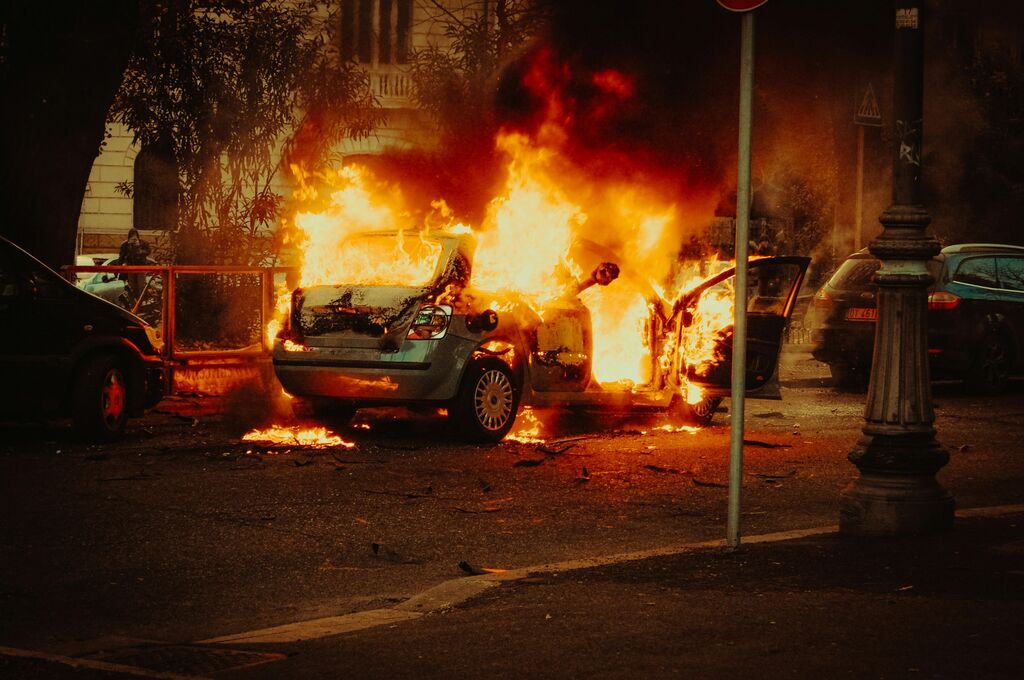Nigel Farage thinks we’re on the brink of mass civil disobedience. Is he right?

As MPs depart for their summer holidays, a rare thing broke out across Westminster this week: a consensus between leading political figures.
On Monday, Reform leader Nigel Farage gave a press conference, setting out his party’s plans to tackle crime rates. He warned in the Q&A after that people in London did not realise how close Britain is to ‘civil disobedience on a vast scale in this country’.
On Wednesday, Deputy Prime Minister Angela Rayner told the Cabinet that the UK risked a repeat of last summer’s riots unless changes were made to ‘repair the social fabric’ of the UK.
And then Tory leader Kemi Badenoch agreed with Rayner, whilst also accusing her of jumping on bandwagons rather than addressing the issues. This was a reference to the photo of Rayner and Starmer taking the knee in support of the Black Lives Matter protests in 2020.
Consensus between leading political leaders is rare. So when it happens, it is always worth interrogating it and asking whether it is correct.
Breakdown Britain?
Looming large in the minds of our politicians are the riots that took place across the country in response to the brutal and tragic murder of three young girls in Southport. Information spread online that the perpetrator was an asylum seeker.
The violence and disorder were severe enough to prompt Elon Musk to predict not just civil disobedience, but civil war would ‘inevitably’ break out.
A new report out this week by the charity People’s Health Trust warned that the riots had a ‘devastating long-term impact on the mental and physical health of affected communities.”
With memories of last summer no doubt ringing in their minds, politicians were all the more alarmed, then, by the demonstrations taking place in Epping earlier this week. Protestors stood outside a hotel there that houses asylum seekers. One of them, Habush Kebatu, 41, from Ethiopia, is accused of rape, harassment and incitement to a sexual act. He has denied the offences.
But Epping is just the tip of the iceberg. Surely we have all noticed the signs of growing tensions between communities, the frustration and anger at how broken our country seems to be, and the Government’s inability to fix it?
Writer Alexander Poots said a few months ago: “Everyone has their own examples of this granular decay. Think of the rats, so plump of Birmingham rubbish they’re now the size of cats; or the metal security tags in shops protecting £4 fish fillets; or the depthless cringe of police officers who dress up as Batman and Robin to catch con-artists within spitting distance of parliament.”
But I think it goes much deeper than rats and rascals. Falling living standards, the rising cost of living, and no hope for first time buyers of ever making it onto the property ladder are all contributing to a sense of hopelessness, plus a weak job market meaning increased unemployment. I’d add in the colossal damage being done by family breakdown, which leads to poverty, blights educational attainment and costs the tax payer upwards of £50billion a year.
When you throw in rising level of illegal migration, massive NHS waiting lists, and more public sector strikes it is not a big surprise that a protest party like Reform are surging in the polls.
David Betz, the professor of War in the Modern World at King’s College London is pretty sure this ‘perfect storm’ of factors means civil war is coming.
For Betz what makes everything worse is the lack of legitimacy when it comes to the Government. A record 45% of Brits ‘almost never’ trust the Government to put the nation first. “There has been a collapse of trust over the course of a generation”, according to Betz. Public trust in politicians is at an all-time low.
But it’s not just the Government we do not trust. Betz is worried that public trust in all our institutions is collapsing. For example, no one trusts the police these days. Stories abound where someone has had their phone stolen. They track it using their ‘Find a phone’ app and can identify exactly where it is. They tell the police, who refuse to do anything about. No wonder Nigel Farage is promising six-foot tall, strapping hulk-like men as the future of our police force!
Maybe you think this is all just a bit negative—that the idea of another civil war on the horizon is simply scaremongering.
Perhaps you’re right. But if we look at what God says in his word, I do not think overt optimism, or despondent despair in the answer.
Only God knows the future
We need to remember what sort of world we live in. It is one that is under the judicial curse of God. Remember what the LORD said to Adam after he’d sinned by eating forbidden fruit in the Garden of Eden? In Genesis 3:17 we read “cursed is the ground because of you….” We read of ‘thorns and thistles’ which becomes a watchword in the prophets for the impact of God’s judgement and curse on the created world.
But it is not just the physical creation that is groaning in frustration and bondage (Romans 8:20). Part of God’s judgement is the harmony between image-bearers – human beings – is ruined and distorted as well. God tells Eve that her desire will be for her husband who will ‘rule over her’. In the very next chapter of Genesis we read of Cain murdering his brother Abel. The Bible does not shy away from brutal, sometimes graphic stories of the harm humans can do to each other. Think of the horrendous rape of Tamar (Genesis 38) or the shameful behaviour of Sodom and Gomorrah (Genesis 19).
How should we apply all this? Surely we must admit that the only word Elon Musk got wrong in his tweet was the word ‘inevitable’. The UK could see civil war. And Mr Farage could be right too. Civil disobedience on a mass scale may well break out. We should be thankful to God we do not have the gun laws America does!
But as Christians, our confidence and trust is in the purposeful sovereignty of our God who has mapped out all the days this world shall endure. He alone knows the future and try as we might, we must submit to the fact that we cannot ultimately know if that that future will bring because the ‘secret things belong to the Lord’ (Deuteronomy 29:29).
Dark days will come
What should sober us is to remember the way God’s judgements tend to work themselves out. Romans 1:18-32 detail how it works. As society abandons the truth about God and exchange his glory for the lesser ‘glory’ of created beings, God gives societies over. He removes some of His powerful and providential restraints on sin. When that happens the result is ever increasing disorder, unrest and harm.
We should also remember the words of the Apostle Paul in 1 Timothy 3: “But mark this: There will be terrible times in the last days. People will be lovers of themselves, lovers of money, boastful, proud, abusive, disobedient to their parents, ungrateful, unholy, without love, unforgiving, slanderous, without self-control, brutal, not lovers of the good, treacherous, rash, conceited, lovers of pleasure rather than lovers of God— having a form of godliness but denying its power. Have nothing to do with such people.”
Applied to the UK, the frightening thing is that as a nation, we have and indeed are ‘sinning against great light’. We’re like the Pharisees of Jesus’ day. He criticises them because despite the blessing of God’s word, they have misread it and misapplied it (Matthew 23:23-25). In God’s grace towards us as a nation, we have experienced many outpourings of the Spirit and Christian truth has massively shaped and influenced our land.
Yet today Christianity is being pushed to the very margins of society. Paul’s words to the young pastor Timothy are being fulfilled all around us.
So, given these realities, why are we so sure we won’t see civil war? For decades, the UK has known peace and relative stability. Yet all the while we have passed laws that are flagrant breaches of Almighty God’s will and wisdom for human flourishing. The recent law changes to abortion and assisted suicide are but two examples.
As Christians, Paul helps us see what we must do: “Preach the word, in season, out of season, correct, rebuke and encourage” (2 Timothy 4:1-2). In other words, we must contend for the faith (Jude 3), hold out the word of truth (Philippians 2:16) and seek to persuade others of God’s better story.
Seeking the good of the city
But we can and must do more than contend for the truth.
According to the Bible, the government have a responsibility to maintain order. They are given the sword of judgement (Romans 13:1-7) to commend what is right and punish what is wrong. So we must pray for our government (1 Timothy 2:1-4). Angela Rayner says the government needs to repair the social fabric of society. That is a momentous task and there are no easy solutions to some of the problems identified earlier in this piece.
But we also have a responsibility as citizens. Yes, our ultimate citizenship is in heaven. But we are not called to be so heavenly minded that we are of no earthly good! Remember, this present world will be renewed. So we work now in confident expectation that we are contributing in various ways to the renewal of all things. This is how we know our labour is not in vain (1 Corinthians 15:57-58).
Jesus says we are salt and light (Matt. 5:13-16). We are change makers. And we have a counter-cultural message that follows the law and way of love. It is by loving our neighbour, speaking on behalf of the vulnerable, showing compassion where we can to those less fortunate than ourselves, speaking about Jesus, loving the church. In all these ways we show people what a better world will be like. In Jeremiah 29:7, God calls his people to care for Babylon and to seek its good. We must do the same for the communities where God has placed us.
And time and again in history, God comes and intervenes. He uses the prayers and faithful witness of His people to bring societal change.
A new restoration
I’ll leave you with the with the words of MP Danny Kruger, who courageously spoke to a near empty House of Commons last week, powerfully calling for the Church to renew its mission to bring about the reformation of our politics and our communities:
“To conclude, a wind is blowing, a storm is coming and when it hits we are going to learn if our house is built on rock or on sand, but we have been here before. The reformers of the 11th and the 16th centuries, the Puritans in the 17th century, the Evangelicals in the 19th century all brought this country back from the edge—from idolatry, error or just plain indifference, and from all the social and political crises that indifference to Christianity brought about—and they each in their generation restored this country to itself.
A new restoration is needed now, with a revival of the faith, a recovery of a Christian politics and a re-founding of this nation on the teachings that Alfred made the basis of the common law of England all those centuries ago. This is a mission for the Church under its next leader, whoever that is; it is a mission for this place—the old chapel that became the wellspring of western democracy—and for us, its Members; and it is a mission for our whole country. It is the route to a prosperous modernity founded on respect for human dignity, responsibility for the created world and the worship of God.”






